Overview
The article titled "10 Essential Tips for a Person with Type 2 Diabetes" offers compassionate guidance for effectively managing Type 2 diabetes. It highlights the importance of:
- A balanced diet
- Regular exercise
- Blood sugar monitoring
- Medication adherence
- Routine check-ups
- Stress management
- Hydration
- Support groups
- Education
Each of these elements plays a crucial role in empowering you to take control of your health and enhance your overall well-being.
It's understandable to feel overwhelmed at times, but remember that you are not alone in this journey. These tips are designed to provide you with practical steps that can make a significant difference in your daily life. By embracing a balanced diet and engaging in regular physical activity, you can help maintain stable blood sugar levels and improve your energy.
Additionally, monitoring your blood sugar and adhering to your medication regimen are vital components of managing your condition. Routine check-ups with your healthcare provider can offer reassurance and keep you informed about your progress. Don't underestimate the importance of managing stress and staying hydrated, as these factors can greatly impact your health.
Connecting with support groups can also provide a sense of community and shared understanding. Engaging with others who are on similar paths can foster a nurturing environment where you can share experiences and advice. Education is key; the more you know, the more empowered you will feel.
We are here to support you every step of the way. Take these tips to heart, and consider reaching out for additional resources or support when needed. You have the strength to navigate this journey, and with the right tools, you can thrive.
Introduction
Navigating the complexities of type 2 diabetes can often feel daunting and isolating. It's understandable to feel overwhelmed at times. However, understanding effective management strategies can transform this experience into one of empowerment and resilience. This article presents ten essential tips that not only highlight practical approaches to managing diabetes but also emphasize the importance of community support, education, and proactive health measures.
How can you harness these strategies to improve your quality of life while effectively controlling your condition? The insights shared here may hold the key to unlocking a healthier future, and remember, you're not alone in this journey.
T2DSolutions: Comprehensive Resources for Managing Type 2 Diabetes
At T2DSolutions, we are just beginning our journey, and we are genuinely excited to share a wealth of resources tailored for a person with type 2 diabetes navigating their condition. Our comprehensive educational materials encompass:
- Dietary plans
- Exercise routines
- Insights into the latest medical research
This ensures that you have access to trustworthy information. We also recognize the importance of addressing Type 3 Diabetes, providing updates and expert articles that enhance your understanding and preventive care.
This holistic approach empowers a person with type 2 diabetes to make informed choices about their health while fostering a supportive community for individuals affected by this condition. Remember, you're not alone in this journey; we are here to support you every step of the way. Be sure to subscribe to stay up to date and receive emails when new content is published. Let T2DSolutions be your go-to resource for diabetes management, where you can find the guidance and support you need.
Adopt a Balanced Diet: Prioritize Whole Foods and Nutrient-Rich Meals
For a person with type 2 diabetes, a balanced diet rich in whole foods is crucial for effectively managing their condition. It is important to prioritize nutrient-dense meals that include a variety of vegetables, whole grains, lean proteins, and healthy fats. You might feel overwhelmed by the many options available, but steering clear of processed foods filled with sugars and refined carbohydrates can help prevent significant spikes in blood sugar levels.
Meal planning and portion control are essential strategies for maintaining a healthy diet. It's understandable to feel unsure about where to start, but engaging with a registered dietitian can provide you with the support you need. They can help you develop a personalized meal plan tailored to your specific needs, ensuring that you receive the right nutrients to support your health.
Remember, you're not alone in this journey. We are here to support you every step of the way.
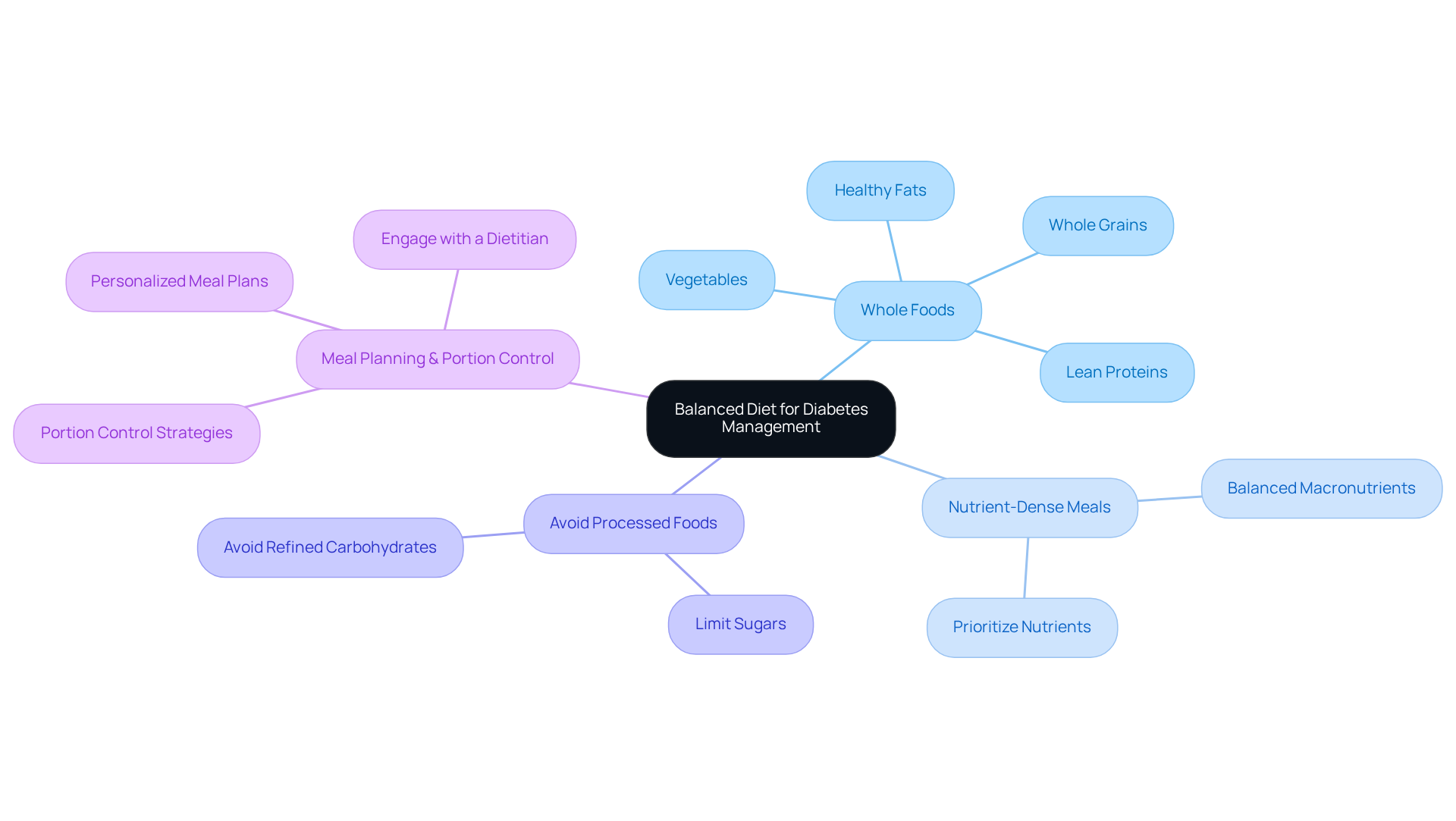
Engage in Regular Exercise: Incorporate Aerobic and Strength Training Activities
For a person with type 2 diabetes, engaging in regular exercise is crucial for managing their condition, and you're not alone in this journey. Aim for at least 150 minutes of moderate-intensity aerobic activity each week, such as brisk walking, cycling, or swimming. It's understandable to feel overwhelmed—research shows that approximately 50% of people who start an exercise program drop out within the first 6 months. This highlights the importance of maintaining motivation and finding what works for you.
In addition to aerobic activities, consider incorporating strength training exercises at least twice a week. Building muscle can significantly improve insulin sensitivity, and effective activities may include:
- Weight lifting
- Resistance band exercises
- Bodyweight workouts
Remember, breaking up sitting time with movement throughout the day can positively impact your blood glucose and insulin levels.
Before starting a new exercise regimen, a person with type 2 diabetes should always consult with their healthcare provider to ensure it aligns with their health status. To enhance adherence to your routine, choose enjoyable activities like:
- Dance classes
- Walking clubs
Tracking your progress through apps or activity trackers can help maintain motivation and commitment to your fitness goals.
Lastly, try to avoid going more than two days in a row without being active. This will help keep your exercise habits strong. You're taking important steps toward better health, and we are here to support you every step of the way.
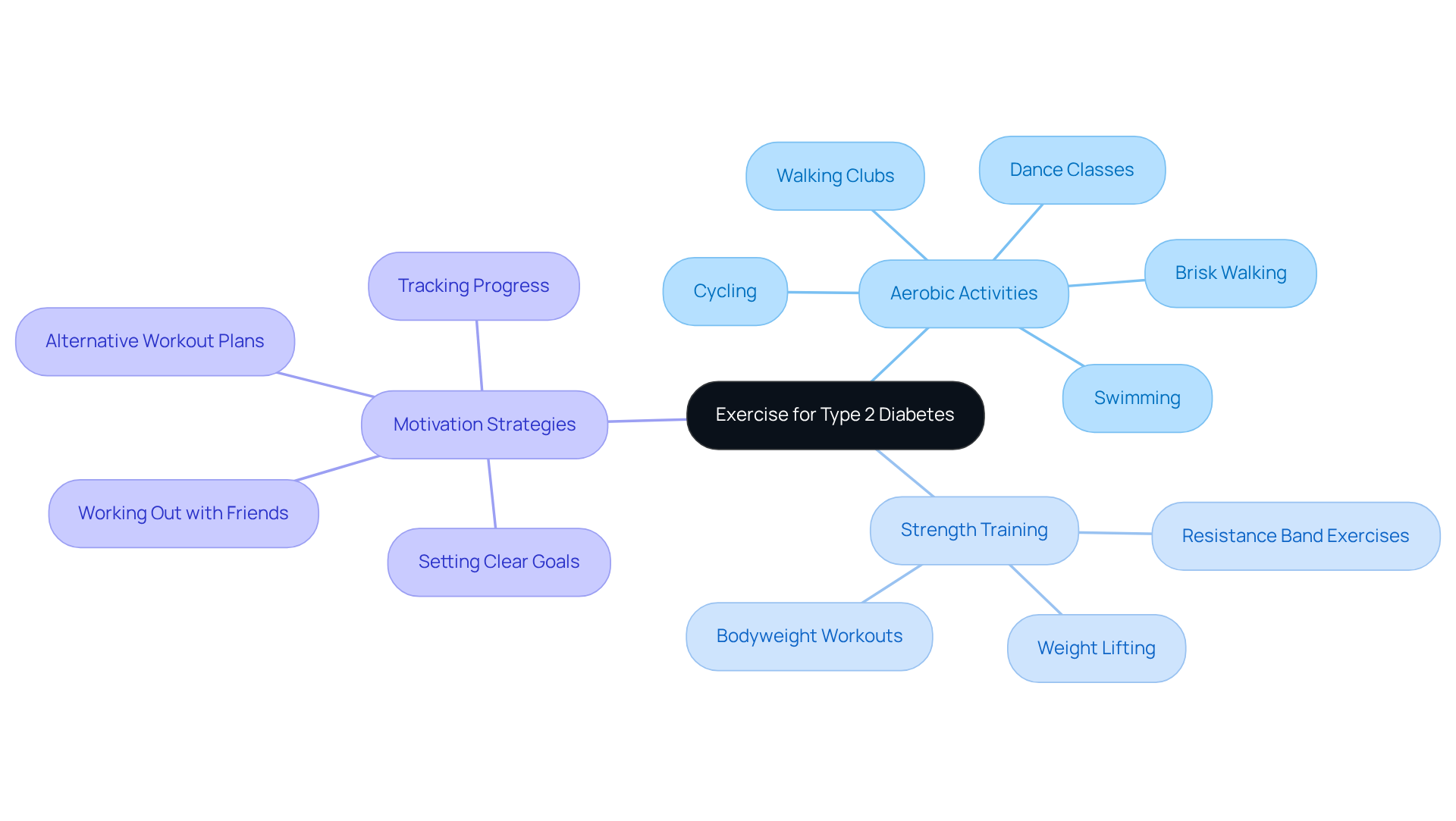
Monitor Blood Sugar Levels: Use Glucometers for Regular Tracking
For a person with type 2 diabetes, managing blood glucose levels is an important part of their health journey, and consistent tracking is crucial for effective control. Using a glucometer to check your blood glucose before and after meals, as well as at bedtime, can provide you with valuable insights. Keeping a detailed log of your readings can help you identify patterns, guiding your dietary and medication decisions. Remember, striving to maintain your blood sugar within the target range established by your healthcare provider is essential for your well-being.
If you’re looking for a more advanced option, consider continuous glucose monitors (CGMs). These devices offer real-time tracking, giving you valuable insights into your glucose levels throughout the day. Research shows that CGM users, such as a person with type 2 diabetes, often experience more time within the glycemic target range and lower A1C levels compared to those who rely solely on traditional fingerstick monitoring. A recent study even highlighted that using a CGM can significantly enhance glycemic control for a person with type 2 diabetes, truly making it a game-changer in managing their blood sugar levels.
As the glucometer market evolves, advancements in technology are enhancing user experiences. It's important to stay informed about the latest developments and best practices for effective blood sugar monitoring. You're not alone in this journey; we are here to support you every step of the way. If you have questions or need guidance, don't hesitate to reach out for support or resources that can help you manage your condition more effectively.
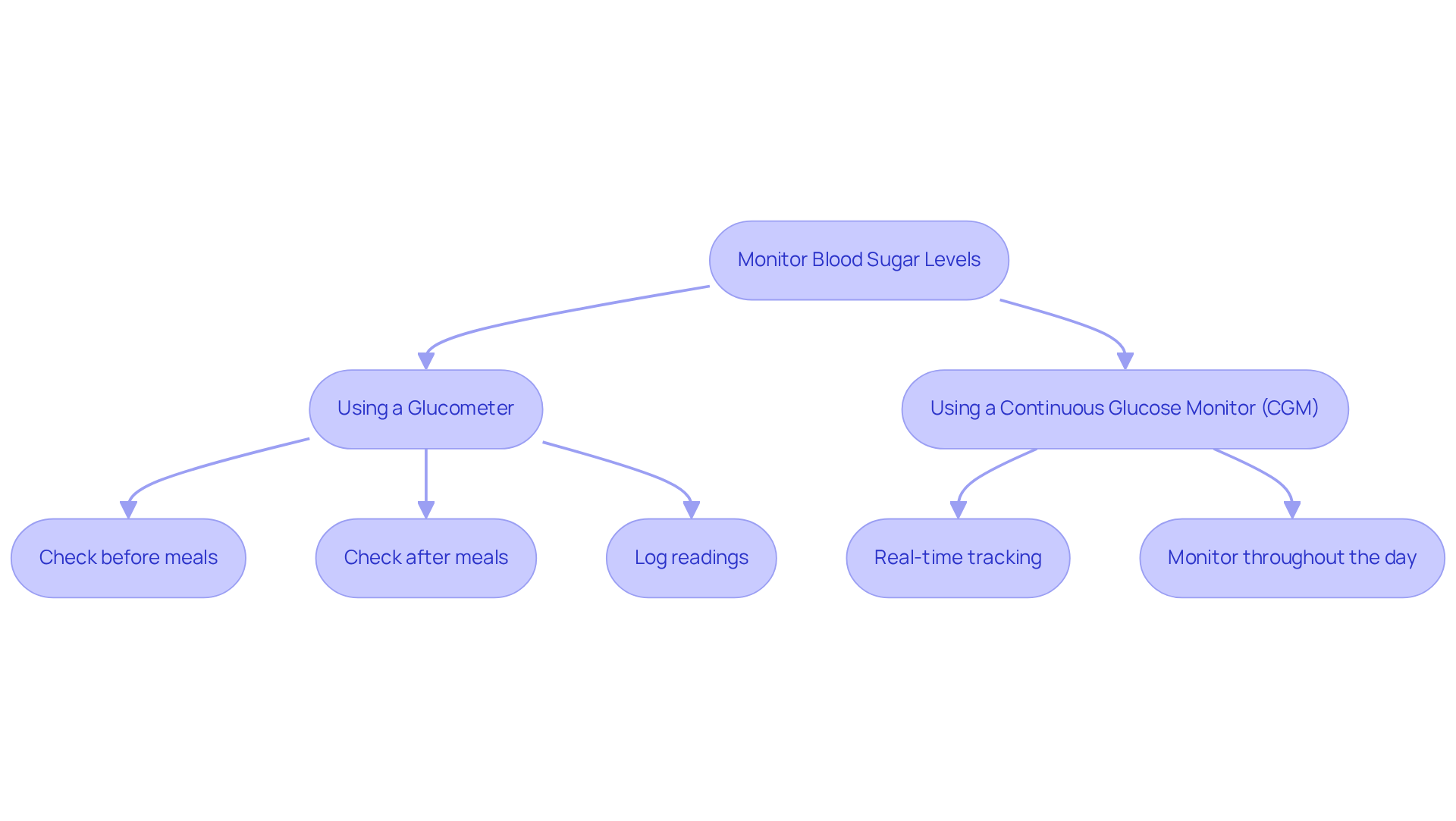
Adhere to Medication Regimens: Follow Prescribed Treatments Consistently
Adhering to your prescribed medication regimen is crucial for effectively managing the health of a person with type 2 diabetes. It's understandable to feel overwhelmed, but regular medication consumption can significantly impact your health outcomes. Research shows that compliance rates among patients with diabetes-related conditions typically average about 50-60%. This non-adherence can lead to severe complications and increased healthcare costs, which can be concerning. To enhance your adherence, consider:
- Setting reminders
- Utilizing pill organizers to help you remember to take your medications on time
In fact, 65.4% of participants in a study reported having forgotten to take their medication. This underscores the importance of these strategies.
Engaging with support networks can also provide motivation and accountability. Support from loved ones and healthcare providers can encourage you to stick to your medication regimens. Remember, if you experience side effects or have concerns about your medications, it’s essential to communicate openly with your healthcare provider. They can help you explore alternatives or make necessary adjustments to your treatment plan. Effective approaches for managing blood sugar treatments involve:
- Utilizing technology, like medication reminder applications
- Creating a routine that incorporates medication consumption into your everyday life
For a person with type 2 diabetes, maintaining consistency in their medication regimen is essential for achieving optimal glycemic control and preventing complications related to the condition. Aim for a medication adherence rate greater than 80% to achieve optimal therapeutic outcomes. This threshold is essential for effective oversight, and you're not alone in this journey. We are here to support you every step of the way.
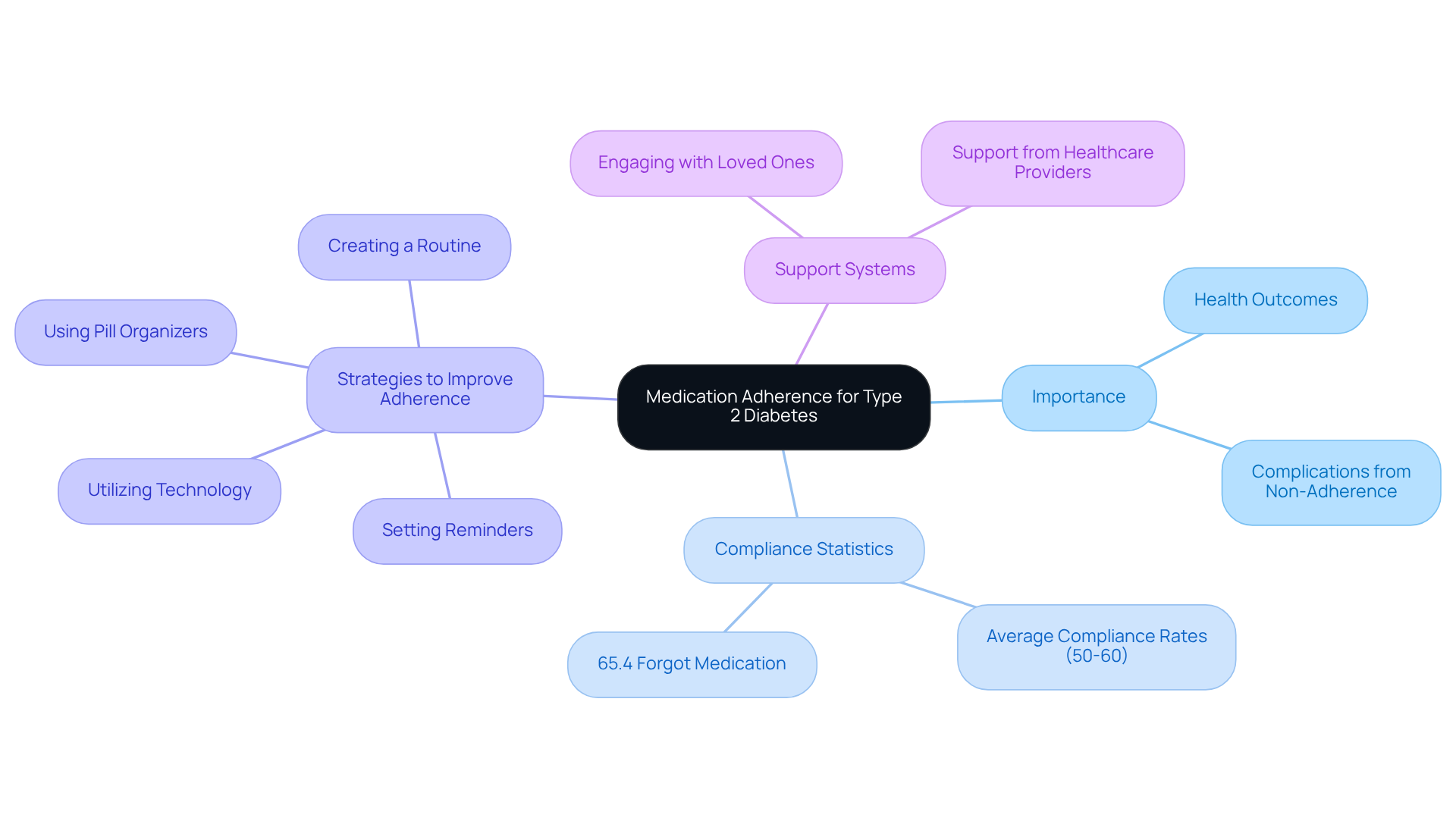
Schedule Regular Check-Ups: Stay Proactive with Healthcare Providers
Arranging routine check-ups with your healthcare provider is essential for a person with type 2 diabetes to effectively manage their blood sugar levels. Aim for at least two visits each year, or more frequently if your levels are not well-controlled. During these visits, your healthcare provider will monitor your blood pressure, cholesterol levels, and overall health. They may also recommend necessary screenings for diabetes-related complications, such as eye exams and foot checks, specifically for a person with type 2 diabetes. It's understandable to feel overwhelmed, but staying proactive in your healthcare can help prevent serious complications down the line.
Additionally, T2DSolutions serves as a valuable resource hub for diabetes education and community support specifically for a person with type 2 diabetes. They offer newly diagnosed patients access to essential information and tools to manage their condition effectively. Remember, you’re not alone in this journey; we are here to support you every step of the way. Seeking help and resources can empower you to take charge of your health.
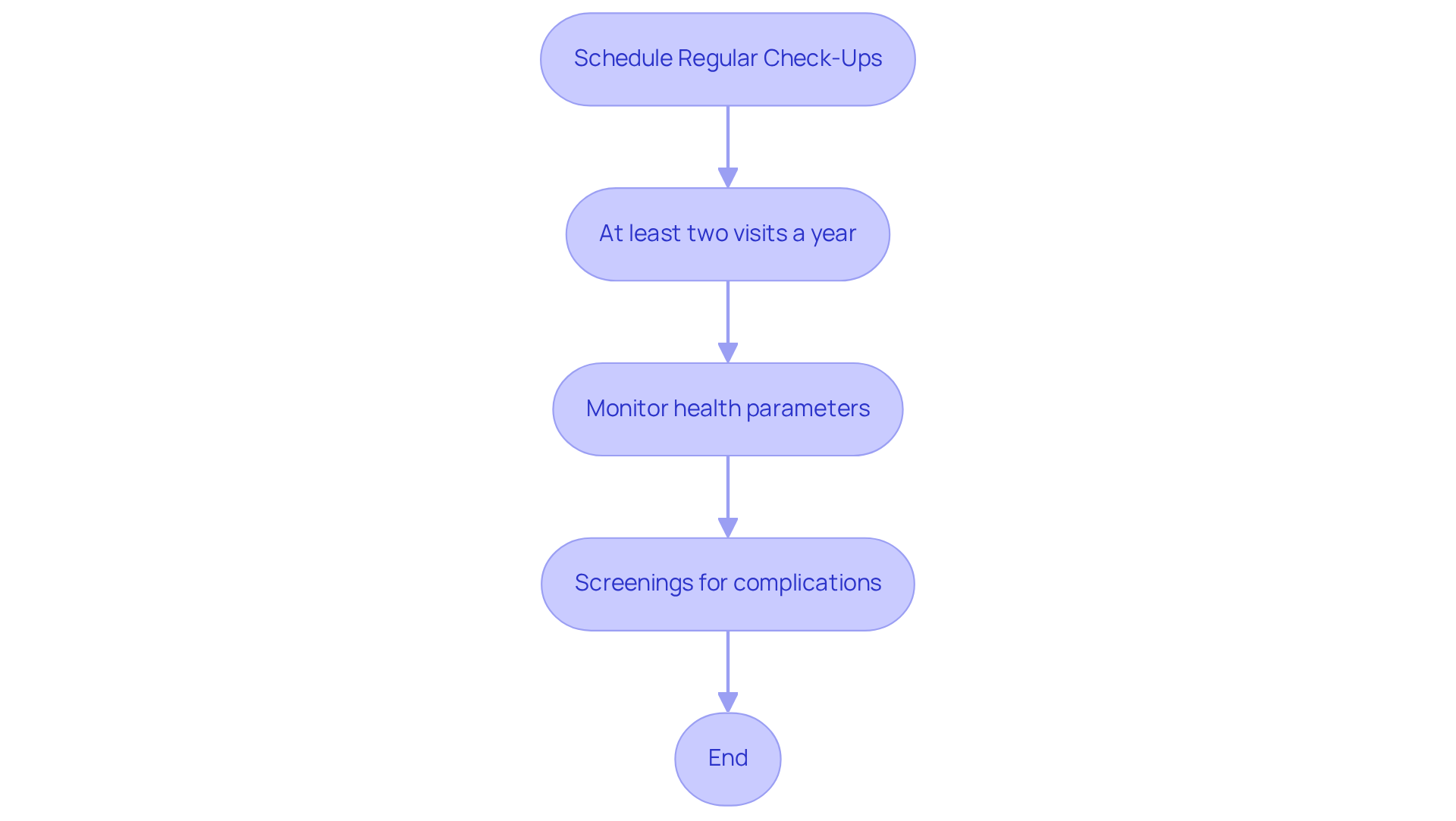
Practice Stress Management: Utilize Techniques Like Meditation and Yoga
Managing stress is crucial for a person with type 2 diabetes, as stress can significantly impact their blood sugar levels. It's understandable to feel overwhelmed, but incorporating mindfulness practices like:
- Meditation
- Yoga
- Deep-breathing exercises
into your daily routine can make a difference. These techniques not only help reduce stress but also enhance your emotional well-being.
Consider engaging in hobbies or spending quality time with loved ones; these activities can also contribute to better stress management. Additionally, ensuring you get enough sleep is vital for maintaining control over your stress levels. Remember, you're not alone in this journey, and taking small steps can lead to meaningful improvements in your life.
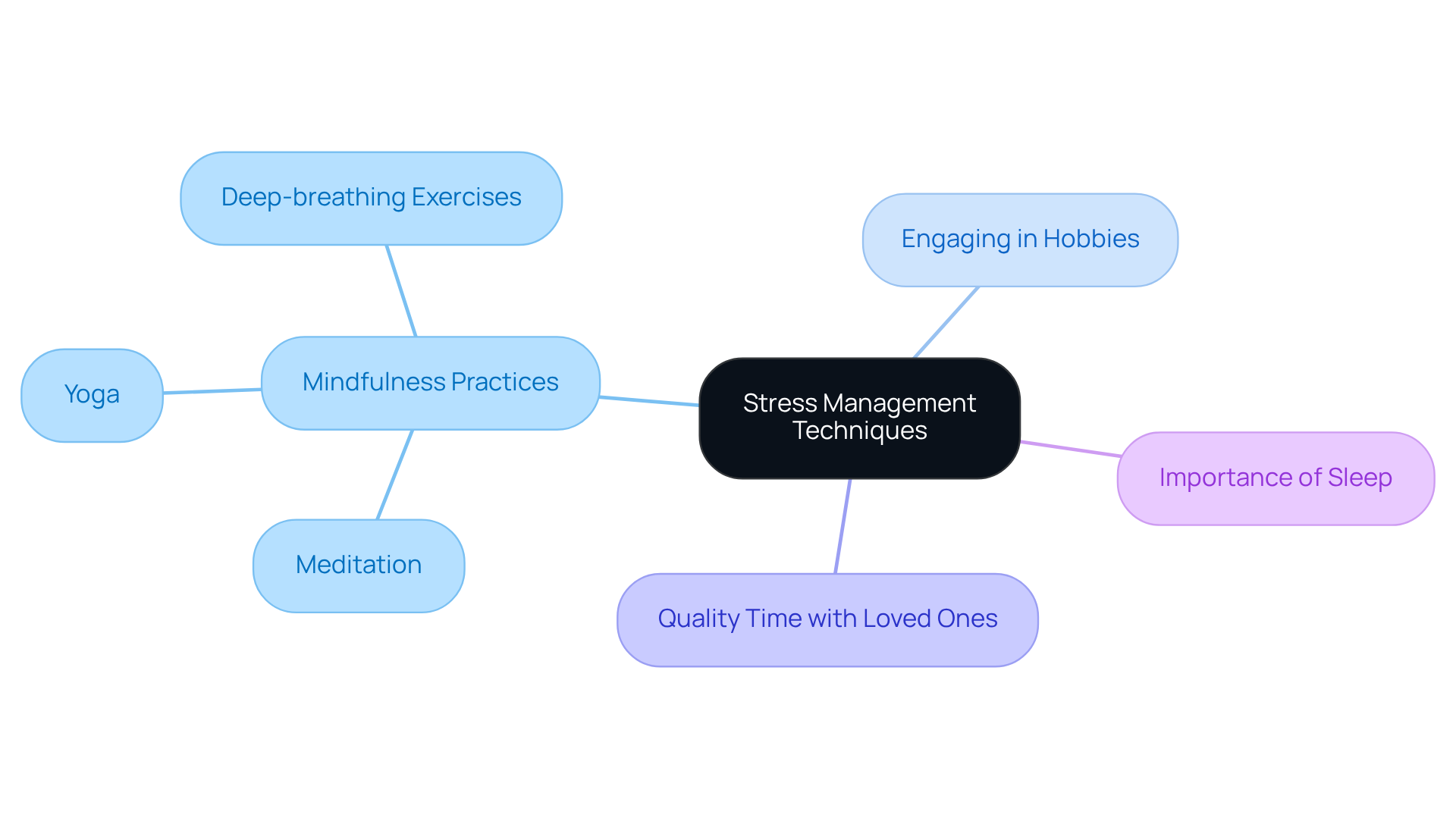
Stay Hydrated: Drink Plenty of Water Throughout the Day
Adequate hydration is crucial for a person with type 2 diabetes to effectively manage their condition. It's important to aim for ample water consumption throughout the day, as it plays a vital role in maintaining stable blood sugar levels and supporting overall health. Dehydration can lead to elevated blood sugar concentrations, making it essential to develop a habit of carrying a water bottle with you. Setting reminders to drink water regularly can be particularly helpful for those who often forget.
In addition to plain water, herbal teas and other low-calorie beverages can positively contribute to your daily fluid intake. Nutritionists emphasize that staying well-hydrated aids a person with type 2 diabetes in regulating their blood sugar levels by facilitating the transport of glucose and insulin throughout the body. The Institute of Medicine recommends about 13 cups of water per day for men and 9 cups for women, but individual needs may vary based on factors such as age, activity level, and health conditions.
Recent studies have shown that increased hydration can improve blood sugar control for a person with type 2 diabetes. Findings indicate that increased water intake was associated with 15 fewer nephrolithiasis events per 100 participants over 5 years. Monitoring hydration levels is also important; checking the color of your urine can provide a quick assessment—light yellow indicates good hydration, while darker shades suggest a need for more fluids.
By prioritizing hydration, a person with type 2 diabetes can significantly influence their blood sugar management and enhance their overall well-being. Remember, you're not alone in this journey; prioritizing your health is a step in the right direction. For additional resources and assistance, visit T2DSolutions, your all-inclusive center for diabetes education. We are here to support you every step of the way.
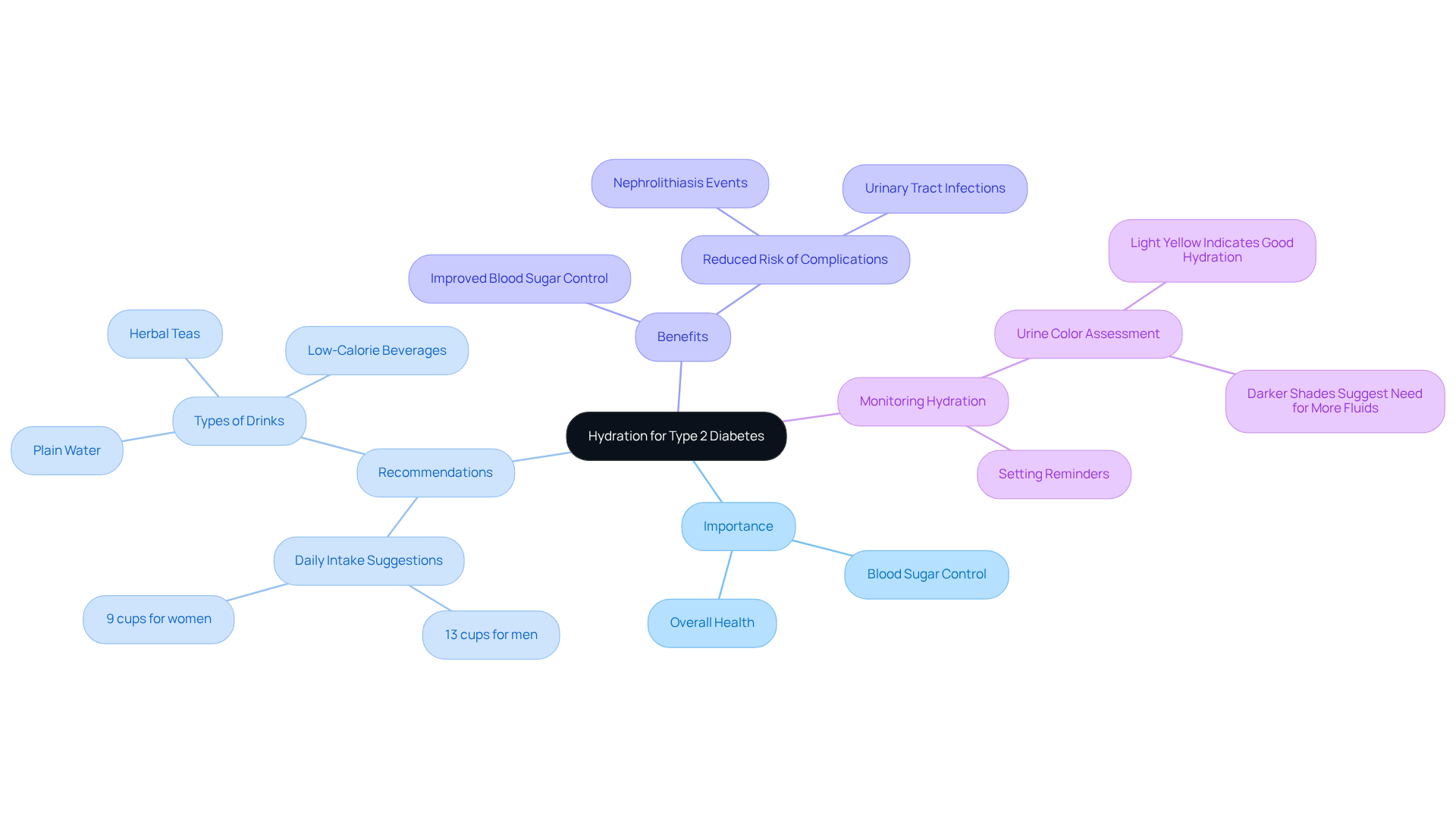
Join Support Groups: Connect with Others Facing Similar Challenges
Joining a diabetes assistance group can significantly enhance the experience of a person with type 2 diabetes in managing their condition. These groups create a welcoming environment where you can share your journey, discuss challenges, and celebrate victories with peers who truly understand your struggles. The emotional support offered in these spaces is invaluable; it fosters a sense of belonging and diminishes feelings of isolation. Members often share practical advice and coping strategies, leading to improved self-care and healthier lifestyle choices.
Research indicates that peer assistance can lead to better clinical outcomes, including reduced hemoglobin A1c levels and improved weight control. Many individuals express feeling empowered and motivated to adhere to their health plans after engaging in group support. Organizations like T2DSolutions provide free NHS certified education and resources, guiding you to find local or online groups tailored to your needs.
As the management of blood sugar conditions evolves, trends show an increasing participation rate in both face-to-face and online groups. This shift enhances accessibility, allowing you to connect with others regardless of geographical barriers. Whether you prefer in-person interactions or online forums, the key is to discover a community that resonates with you. Remember, peer support should complement, not replace, medical advice from trained professionals. You're not alone in this journey; connecting with others can offer the understanding and support necessary for a person with type 2 diabetes to navigate the complexities of diabetes care successfully. Explore T2DSolutions for additional resources and assistance tailored to your needs.
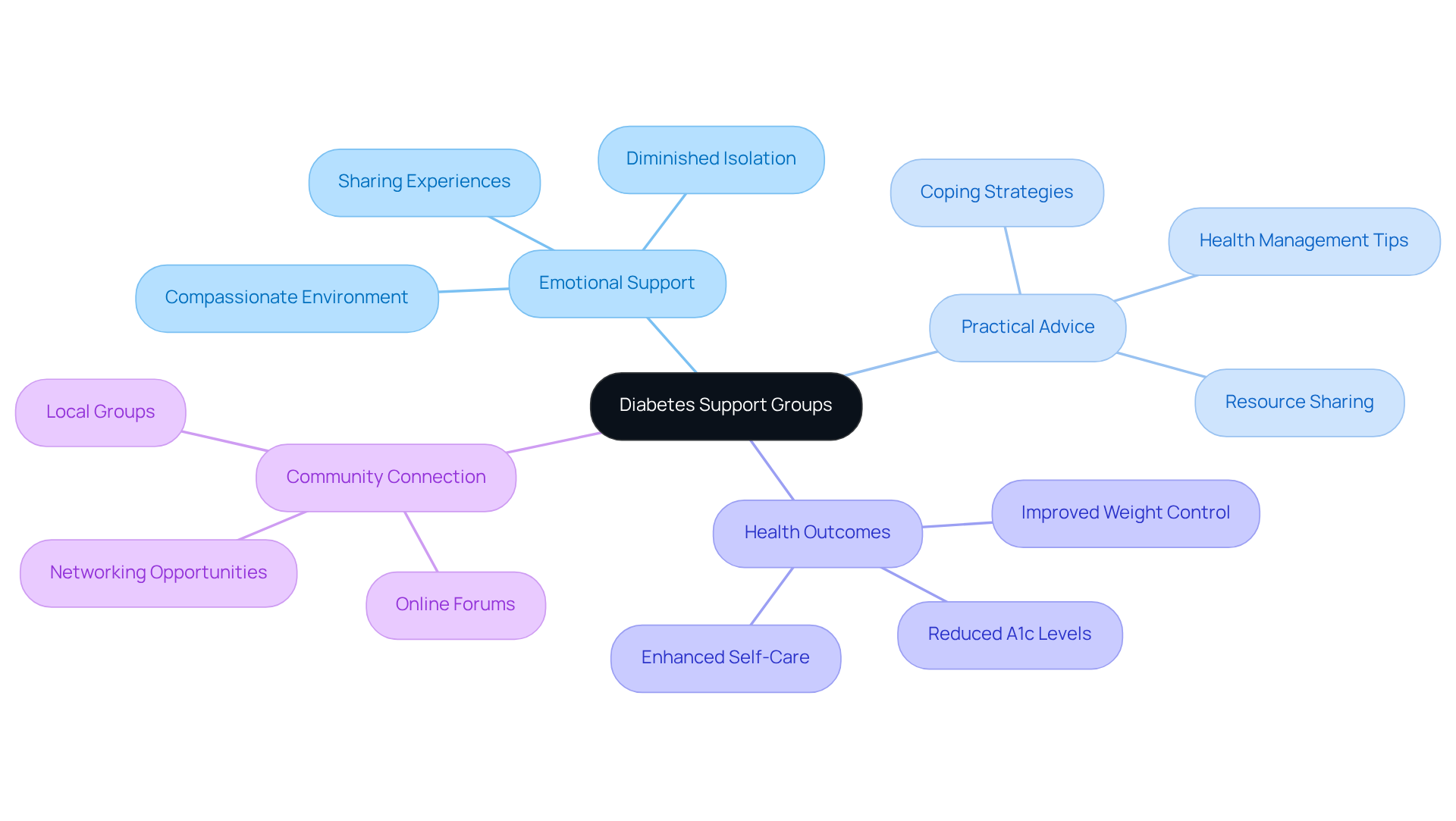
Educate Yourself: Understand Type 2 Diabetes and Its Management Strategies
Learning about Type 2 Diabetes is crucial for effective oversight, and T2DSolutions is here to assist a person with type 2 diabetes on this journey. As a fresh resource center focused on Type 2 and Type 3 blood sugar education and community assistance, T2DSolutions provides a wealth of information to help the person with type 2 diabetes understand the condition, its causes, and different approaches for managing it.
It's understandable for a person with type 2 diabetes to feel overwhelmed, but they can utilize resources from T2DSolutions, reputable organizations focused on blood sugar management, and healthcare providers to gain a comprehensive understanding of their condition. Understanding empowers a person with type 2 diabetes to make informed choices regarding their health, including dietary selections and medication compliance, ultimately leading to improved management of blood sugar levels.
Research indicates that participation in self-management education services related to blood sugar control can reduce hemoglobin A1C by a minimum of 0.6% for a person with type 2 diabetes, significantly enhancing their overall health results. Moreover, the incorporation of technology and virtual assistance systems has proven beneficial in encouraging self-care for a person with type 2 diabetes. For instance, a recent study revealed that virtual asynchronous education regarding blood sugar management for a person with type 2 diabetes, along with personalized counseling, effectively lowered A1C values.
As you educate yourself, consider the economic burden of diabetes, especially for a person with type 2 diabetes, which totaled $412.9 billion in the United States in 2022. This underscores the importance of effective management strategies for a person with type 2 diabetes. By leveraging the resources and support available through T2DSolutions, a person with type 2 diabetes can take control of their health and enhance their quality of life. Remember, as a person with type 2 diabetes, you’re not alone in this journey; we are here to support you every step of the way.
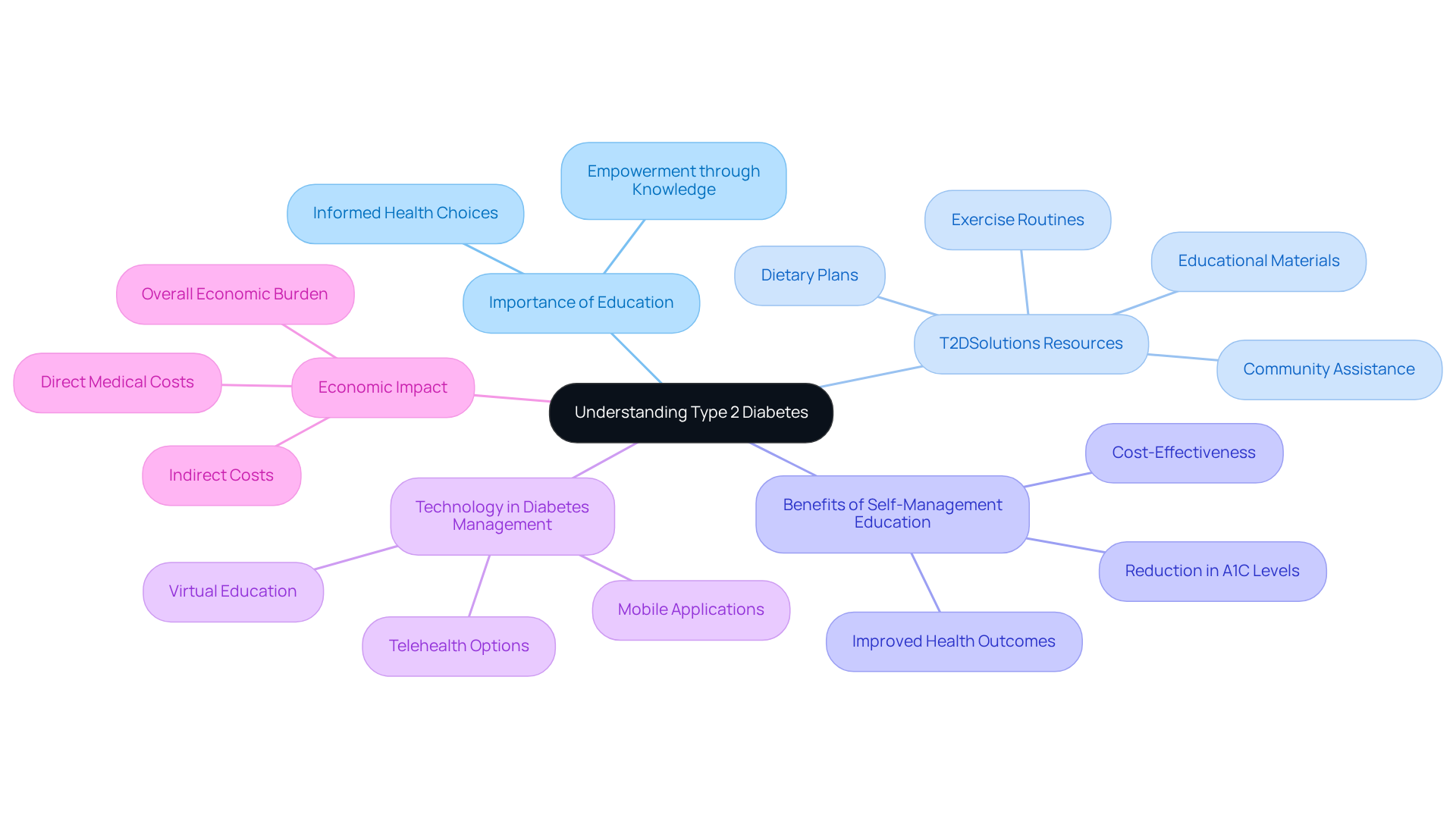
Conclusion
Managing type 2 diabetes can feel overwhelming, but a comprehensive approach that includes lifestyle modifications and supportive resources can make a significant difference. By prioritizing a balanced diet, engaging in regular exercise, monitoring blood sugar levels, adhering to medication regimens, and maintaining proactive healthcare, you can improve your health outcomes. Additionally, incorporating stress management techniques, staying hydrated, and connecting with support groups can enhance your journey toward effective diabetes management.
It's important to understand your condition and utilize available resources, such as T2DSolutions, to foster informed decision-making. Engaging with healthcare providers, participating in educational programs, and building a supportive community are crucial steps that empower you to take charge of your health. Each tip presented serves as a building block toward a healthier lifestyle and better management of type 2 diabetes.
Remember, you don’t have to face this journey alone. By embracing these essential tips and actively seeking out support and resources, you can navigate your condition with confidence. Taking proactive steps today can lead to improved health and well-being tomorrow, reinforcing the idea that informed choices and community support are invaluable in this journey. You're not alone in this journey; we are here to support you every step of the way.
Frequently Asked Questions
What resources does T2DSolutions offer for managing type 2 diabetes?
T2DSolutions provides comprehensive resources including dietary plans, exercise routines, and insights into the latest medical research to help individuals manage type 2 diabetes effectively.
How does T2DSolutions address Type 3 Diabetes?
T2DSolutions offers updates and expert articles on Type 3 Diabetes to enhance understanding and preventive care for individuals affected by this condition.
Why is a balanced diet important for managing type 2 diabetes?
A balanced diet rich in whole foods is crucial for managing type 2 diabetes as it helps prevent significant spikes in blood sugar levels. Nutrient-dense meals that include vegetables, whole grains, lean proteins, and healthy fats are recommended.
What strategies can help maintain a healthy diet for type 2 diabetes?
Meal planning and portion control are essential strategies. Engaging with a registered dietitian can also provide personalized meal plans tailored to specific needs.
How much exercise is recommended for individuals with type 2 diabetes?
It is recommended to engage in at least 150 minutes of moderate-intensity aerobic activity each week, along with strength training exercises at least twice a week.
What types of aerobic activities are beneficial for type 2 diabetes management?
Beneficial aerobic activities include brisk walking, cycling, and swimming.
How can strength training benefit individuals with type 2 diabetes?
Strength training can significantly improve insulin sensitivity, which is crucial for managing blood sugar levels.
What should individuals with type 2 diabetes do before starting a new exercise regimen?
Individuals should consult with their healthcare provider to ensure the exercise plan aligns with their health status.
What are some enjoyable activities to incorporate into an exercise routine?
Enjoyable activities can include dance classes and walking clubs, which help maintain motivation and adherence to fitness goals.
How can tracking progress aid in maintaining an exercise routine?
Tracking progress through apps or activity trackers can help maintain motivation and commitment to fitness goals.
What is the importance of not going more than two days without being active?
Avoiding inactivity for more than two consecutive days helps strengthen exercise habits and positively impacts blood glucose and insulin levels.



